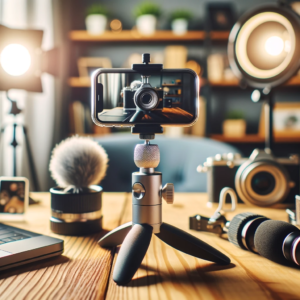In the age of digital media dominance, the demand for videographers has skyrocketed. Whether you’re aspiring to become a professional videographer or simply looking to enhance your video creation skills, there are several key considerations to keep in mind. In this blog post, we’ll explore the essential factors that new videographers should consider on their journey to capturing stunning visuals and telling compelling stories through the lens.

- Equipment and Gear: One of the first things a new videographer should consider is the choice of equipment. While you don’t need to invest in the most expensive gear right away, having a good camera, tripod, microphone, and basic lighting equipment is crucial. Start with what you can afford and gradually upgrade as your skills and budget allow.
- Technical Skills: Videography involves more than just pointing and shooting. It’s essential to understand the technical aspects of your equipment, such as aperture, shutter speed, ISO, and white balance. Learning the basics of video editing software like Adobe Premiere Pro or Final Cut Pro is also essential for post-production.
- Composition and Framing: Great videographers have a keen eye for composition and framing. Learn about the rule of thirds, leading lines, and different shot types like wide, medium, and close-up shots. Mastering these techniques will help you capture visually appealing and engaging footage.
- Storytelling: Videography is not just about pretty visuals; it’s about storytelling. Plan your shots to convey a narrative or message effectively. Consider the emotions you want to evoke in your audience and how each shot contributes to the overall story.
- Audio Quality: Many beginners overlook the importance of good audio quality. Invest in a decent microphone to capture clear and crisp sound. Poor audio can ruin an otherwise stunning video.
- Stabilization: Shaky footage can be distracting and unprofessional. Invest in stabilizing equipment like gimbals or use tripod-mounted shots to ensure smooth and steady footage.
- Lighting: Proper lighting can make a significant difference in the quality of your videos. Learn about different lighting setups and how to use natural light to your advantage. Experiment with lighting to create the mood you want for your videos.
- Editing Skills: Editing is where your raw footage transforms into a polished video. Learn to edit efficiently, use transitions effectively, and add music and sound effects to enhance the viewer’s experience.
- Legal Considerations: Familiarize yourself with copyright laws and permissions for music, images, and other content you may use in your videos. Understanding the legal aspects of videography will help you avoid potential legal issues.
- Continuous Learning: The world of videography is constantly evolving. Stay updated with the latest trends, techniques, and technology in the industry. Consider joining online communities, forums, or taking courses to expand your knowledge.
In conclusion, embarking on a journey as a new videographer can be both exciting and challenging. By considering these essential factors – equipment, technical skills, composition, storytelling, audio, stabilization, lighting, editing, legal aspects, and continuous learning – you’ll be well on your way to creating captivating videos that leave a lasting impression on your audience. Remember that practice makes perfect, so keep honing your skills and never stop experimenting with your creativity. Happy filming!
